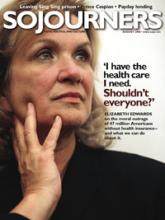In May, Sen. Ted Kennedy was diagnosed with an aggressive brain tumor. The news sent shock waves throughout Washington and across the country. The good news is that as an elected official of financial means, Sen. Kennedy has access to the very best medical care available. Shortly after his diagnosis, a team of nationally renowned oncologists and surgeons successfully removed parts of the tumor, improving his prognosis for a longer life.
One day after this surgery, a janitor and mother of two named Ercilia Sandoval stood before 3,500 fellow members of the Service Employees International Union (SEIU) to tell her own—very different—health-care story.
Two years earlier, Ercilia and her fellow janitors at Houston’s biggest cleaning companies won a long fight to form a union and, for the first time, get health coverage. But for Ercilia that victory would come too late. The mother of two young daughters had already been diagnosed with cancer, and without insurance she had been unable to afford lifesaving treatments. “I don’t want what happened to me—to become sick without access to medical insurance—to happen to anyone else,” she said, describing what it was like “to be rejected by a hospital despite all the great pain you’re feeling.”
Ercilia Sandoval. Ted Kennedy. Two individuals fighting for their lives in the same country, but with dramatically different experiences. The scene compels us to cry out with the prophet Jeremiah, “Is there no balm in Gilead? Is there no physician there? Why then has the health of my poor people not been restored?”
This is the legacy of our health-care system’s moral and economic failure: nearly 10 million children without coverage; families one medical emergency away from bankruptcy; elderly and infirm people without the resources necessary to live—or die—in relative comfort and with dignity.
Read the Full Article
